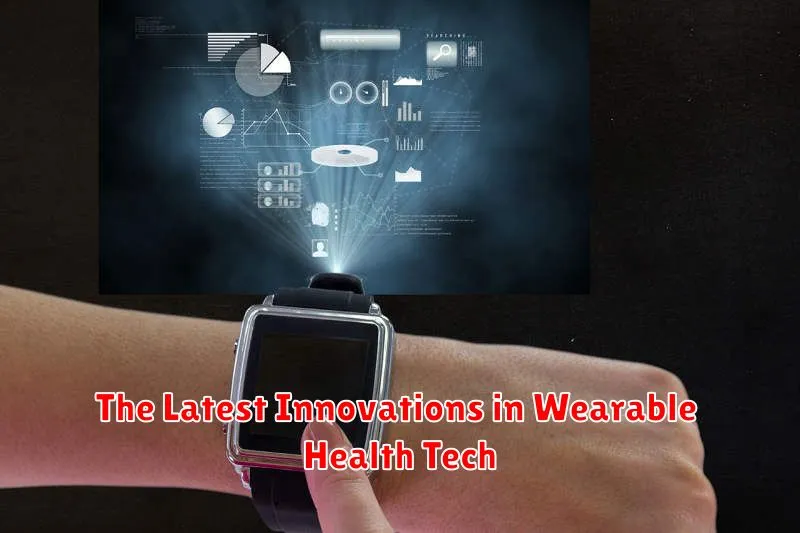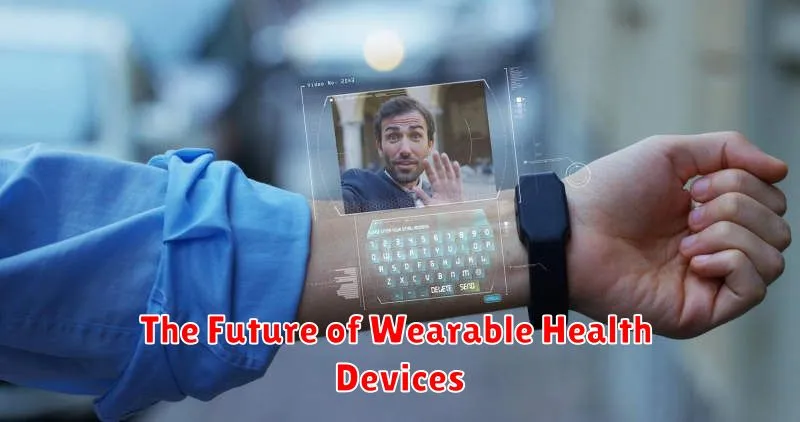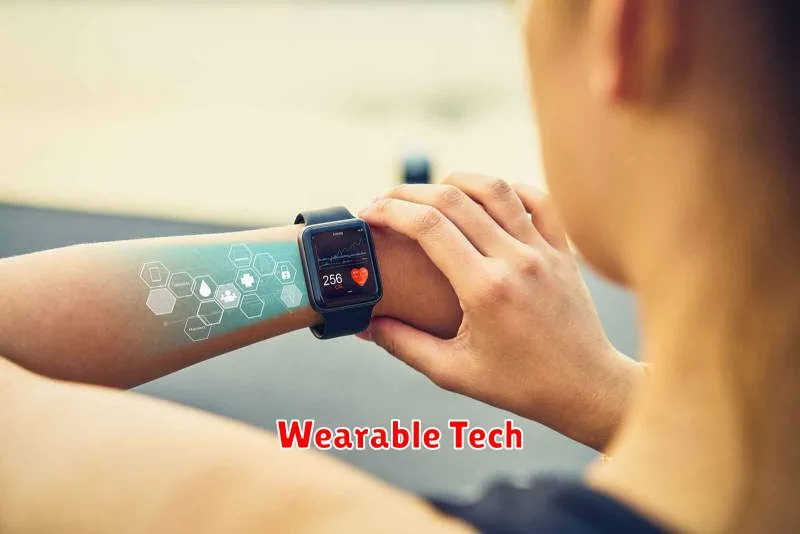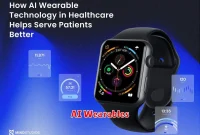The realm of health technology is rapidly evolving, with wearable devices taking center stage. These smartwatches, fitness trackers, and other connected devices are no longer just fashion accessories; they’re becoming powerful tools for monitoring our health, promoting wellness, and potentially even preventing disease. From heart rate monitoring and sleep tracking to blood glucose monitoring and fall detection, the capabilities of wearable health technology are expanding at an impressive pace.
This article delves into the exciting future of wearable health technology, exploring the latest advancements, emerging trends, and the potential impact on both individuals and the healthcare industry. We’ll examine how these innovative devices are empowering individuals to take control of their health, enabling personalized healthcare, and driving medical breakthroughs. Join us as we navigate the exciting landscape of wearable health technology and envision its transformative potential.
The Latest Innovations in Wearable Health Tech

The field of wearable health technology is rapidly evolving, with new innovations constantly emerging to improve our health and well-being. From smartwatches to advanced sensors, wearable health tech is becoming increasingly sophisticated, offering a wide range of functionalities.
One of the latest trends is the integration of artificial intelligence (AI) into wearable devices. AI algorithms are used to analyze data collected from sensors, providing personalized insights and predictions. For example, AI-powered wearables can detect early signs of health issues, track sleep patterns, and optimize exercise routines.
Another exciting development is the rise of biometric monitoring. Wearable devices are now capable of measuring vital signs such as heart rate, blood pressure, and oxygen levels with remarkable accuracy. This data can be used to monitor health conditions, track fitness progress, and even diagnose diseases.
Moreover, advanced sensors are being incorporated into wearables, expanding their capabilities. For instance, some devices can now measure glucose levels, skin temperature, and even detect falls. These advancements are empowering individuals to take control of their health and make informed decisions.
The future of wearable health technology holds immense promise. As the technology continues to evolve, we can expect even more innovative solutions that will revolutionize healthcare and enhance our lives. From personalized medicine to preventative care, wearables are poised to play a pivotal role in shaping the future of health.
How Wearable Devices are Transforming Healthcare
Wearable technology has revolutionized healthcare, offering unprecedented insights into our health and well-being. These devices, ranging from smartwatches to fitness trackers, are continuously collecting data on various physiological parameters, including heart rate, sleep patterns, activity levels, and even blood oxygen levels.
One of the most significant impacts of wearable devices is the ability to enable proactive health monitoring. By collecting real-time data, individuals can track their progress, identify potential health risks early on, and make informed decisions about their lifestyle choices. This continuous monitoring empowers individuals to take ownership of their health, leading to better disease prevention and management.
Furthermore, wearable devices facilitate remote patient monitoring, making healthcare more accessible and efficient. Doctors can access patient data remotely, allowing for timely interventions and personalized treatment plans. This is particularly beneficial for patients with chronic conditions, enabling them to receive continuous care without frequent hospital visits.
Beyond monitoring, wearable technology is also driving advancements in diagnosis and treatment. For instance, smartwatches can detect irregular heart rhythms, potentially preventing serious heart events. Wearable sensors are being integrated into prosthetics and other assistive devices, improving functionality and enhancing the lives of individuals with disabilities.
The transformative power of wearable devices is evident in various aspects of healthcare, from promoting healthy habits to enabling early disease detection and facilitating remote monitoring. As technology continues to evolve, we can expect even more innovative applications, further shaping the future of healthcare and empowering individuals to lead healthier lives.
AI in Wearable Health Technology
The integration of Artificial Intelligence (AI) into wearable health technology is revolutionizing the way we approach healthcare. AI algorithms are now capable of analyzing vast amounts of data collected from wearables, providing personalized insights and improving health outcomes. From monitoring heart rate and sleep patterns to detecting potential health risks, AI-powered wearables are becoming increasingly sophisticated.
One of the most significant advantages of AI in wearable health technology is its ability to personalize health management. By analyzing individual data patterns, AI algorithms can tailor health recommendations, fitness plans, and medication reminders to each user’s unique needs. This personalized approach can lead to greater adherence to treatment plans and improved overall health.
Furthermore, AI is playing a crucial role in early disease detection. By identifying subtle changes in physiological data, AI-powered wearables can alert users and healthcare providers to potential health issues before they become serious. This early detection can be particularly valuable for chronic conditions like diabetes, heart disease, and certain types of cancer.
AI is also empowering remote patient monitoring. Wearable devices equipped with AI can transmit real-time data to healthcare providers, allowing them to track patients’ progress and intervene remotely if necessary. This technology is particularly beneficial for individuals with chronic conditions who require frequent monitoring.
The future of AI in wearable health technology is promising. As AI algorithms continue to improve and the cost of wearable devices decreases, we can expect to see even more sophisticated and impactful applications. From AI-powered virtual assistants that provide personalized health coaching to wearables that can monitor mental health and cognitive function, the potential for AI to transform healthcare is immense.
Challenges in Wearable Health Tech Adoption
While wearable health technology holds immense promise for revolutionizing healthcare, its widespread adoption faces several significant challenges.
One major hurdle is the lack of interoperability between different devices and platforms. This fragmented ecosystem makes it difficult for users to manage and share their health data seamlessly, hindering comprehensive health insights.
Privacy concerns are another critical factor. Users are apprehensive about sharing sensitive health information with technology companies, particularly regarding data security and potential misuse.
Furthermore, the accuracy and reliability of wearable data can vary widely. The lack of standardization and regulation across devices raises questions about the validity of measurements and their clinical significance.
Cost is also a barrier for many individuals, as wearable health devices can be expensive. This price barrier limits accessibility, especially for low-income populations.
Finally, user engagement and motivation are crucial for successful adoption. Users need to be motivated to wear and use the devices consistently to obtain meaningful health insights and achieve desired outcomes.
The Future of Wearable Health Devices

Wearable health devices have revolutionized how we monitor and manage our well-being, transforming from basic fitness trackers to sophisticated health companions. As technology continues to advance, the future of wearable health devices promises even more transformative possibilities.
One exciting development is the integration of artificial intelligence (AI). AI algorithms can analyze vast amounts of data from wearables, providing personalized insights and predictions. This can empower individuals to make informed decisions about their health, detect potential problems early, and optimize their lifestyle choices.
Furthermore, the rise of biometric sensors will lead to more precise and comprehensive health monitoring. Devices will be able to track a wider range of physiological indicators, such as blood pressure, blood sugar levels, and even brain activity. This data can be used to diagnose conditions, monitor treatment effectiveness, and personalize healthcare interventions.
Another key area of advancement is connectivity and interoperability. Wearable devices will seamlessly connect with other healthcare systems, allowing for real-time data sharing with doctors and other healthcare professionals. This will enhance collaboration, improve patient care, and enable remote monitoring and intervention.
The future of wearable health devices holds immense potential to improve our health, well-being, and quality of life. With continuous advancements in technology, we can expect these devices to become even more powerful, personalized, and integrated into our healthcare system, ultimately transforming how we approach health management and disease prevention.
Case Studies: Successful Wearable Health Tech Solutions
The field of wearable health technology is rapidly evolving, with new innovations emerging constantly. These devices offer a unique opportunity to improve health outcomes, empower individuals to take control of their well-being, and transform the healthcare landscape. While there are numerous promising developments, it’s essential to examine real-world applications and successful case studies to understand the true potential of wearable health technology.
One prominent example is the Apple Watch, which has gained widespread adoption and has become a powerful tool for health monitoring. Apple has partnered with healthcare organizations to integrate the Apple Watch into clinical settings, allowing for the remote monitoring of patients with conditions like heart disease and diabetes. The device’s ability to track heart rate, blood oxygen levels, and electrocardiogram readings has proven invaluable in early detection and intervention.
Another noteworthy success story is the Fitbit, which has revolutionized fitness tracking and encouraged individuals to lead healthier lifestyles. Fitbit devices provide users with detailed insights into their activity levels, sleep patterns, and calorie intake. This data empowers individuals to make informed decisions about their health and fitness, leading to positive changes in behavior and improved overall well-being.
The Oura Ring represents a different approach to wearable health technology, focusing on sleep tracking and personalized insights. It utilizes advanced sensors to monitor heart rate variability, body temperature, and sleep stages, providing users with detailed sleep data and recommendations for improving sleep quality. The Oura Ring has gained popularity among individuals seeking to optimize their sleep and understand the impact of sleep on their overall health.



